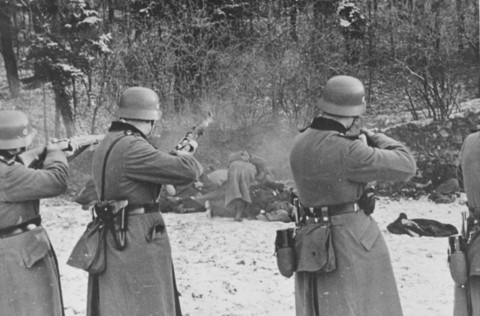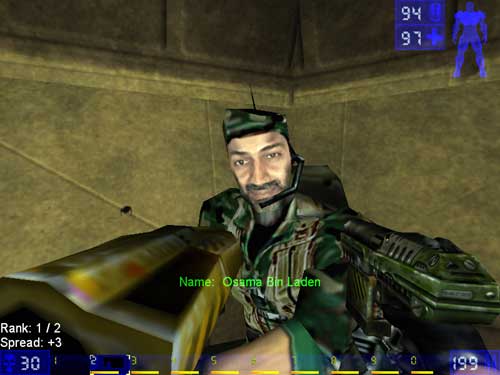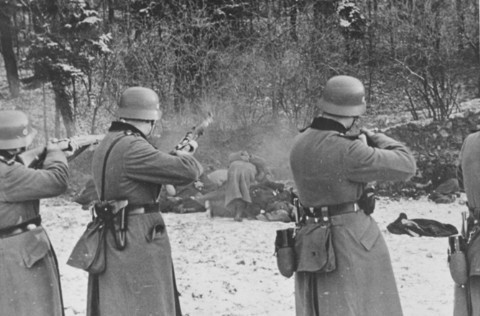
Gas chambers and server browsers. Summary executions and spawn camping. The Holocaust and griefing. What do any of these things have in common? At first glance, nothing. The calculated extermination of Jews and other Untermensch throughout Europe seems antithetical to the irritating antics of bored teenagers on the Internet. So why would I choose to compare them?
Whether we enjoy the notion or not, human beings are horrible creatures. Our history is rife with violent tales of betrayal, subversion, and destruction. While I’m sure that you — the reader — are an open-minded person, equity and tolerance are the exception in human history, not the rule.
It’s an elemental debate we struggle with all the time: Are humans essentially good or bad? The answer isn’t simple. We all respond to external social forces — our identities emerge from the environments we’re exposed to. The more extreme that environment is, the greater the permutational difference becomes. Radical contexts force people to resign their moral proclivities and pursue their own, selfish goals.
But, not all is lost. As we congregate in groups, we establish laws in order to stave the strong, natural desire to ignore morality and seek self-interest. Without these laws, the most abrasive side of humanity shows itself.
Allow me to explore the connection between some of the world’s most characteristically uncontrolled environments. Trust me, there is a link!
During the preliminary hearings of the Nuremburg trials, the public imbibed the gut-wrenching truths of the war. Tales of vengeful officers and morally oblivious conscripts haunted the imagination of the world. It was difficult to consider these criminals as humans. The average tax-paying, law-abiding citizen found very little in common with the villains he saw on television.
However, in the ’60s, sociologists like Philip Zimbardo and Stanley Milgram performed experiments which indicated that practically anyone was capable of such severe violence. They found that accountability and peer pressure were the two most socially coercive tools. Remove the former and apply enough of the latter, and an ordinary person will commit acts which go against his moral customs.
Much like during war, individuals rarely face judgment for their actions on the Internet. In these contexts, you’re rarely reprimanded for shooting a civilian or blocking a doorway.
So why do people behave more belligerently online than in person? Because on the Net, we aren’t subject to ordinary social parameters and consequences. I would give you the same answer if you asked, “Why were Nazi officers so cruel and inhuman?”
It’s paramount that we all understand the power which external social forces have on us. Anonymity and freedom from liability can make us do things which we word normally consider “immoral.”
Take me for instance: I’m a regular guy. I play multiplayer games with my friends. We cooperate and help one another for the sake of achieving our assigned objectives. But every once in a while, especially when I’m playing with strangers, I like to fool around. In Left 4 Dead, I’ll throw Molotov cocktails at my fellow survivors. In Counter-Strike: Source, I’ll shoot all the hostages. In Halo 3: ODST’s Firefight mode, I like to horde all the ammunition. It’s not because I’m a bad person — boredom, lack of accountability, and unfettered freedom are the causes of this behavior. Since online games rarely impose social administration, we resort to our primal instincts. We amuse and gratify ourselves at the cost of others.
This conclusion inevitably raises the question: Does this mean humans are naturally bad? Are we naturally inconsiderate, childish, and short-sighted? Is there some component of human nature which compels us to take advantage of the absence of consequences and pursue desires otherwise looked upon unfavourably? Mike Krahulik and Jerry Holkins of Penny Arcade put it best in a comic of theirs:

The Internet undeniably proves neo-Classical political theories. Hobbes’ famous “state of nature” is a perfect example. Human beings will act without regard toward others when given the opportunity. I’m certain that Machiavelli would be pleased to observe how perfectly the Internet proves that we, as a species, are “nasty” and “brutish” given the correct environment.
Griefers confirm that the only element preventing human beings from treating each other callously is social organization. While they may not know it, griefers shed light on a very interesting — albeit depressing — truth concerning human nature: We are quick to abandon the ethical ideals we hold closest in lieu of self-satisfaction.

As Thomas Hobbes maintained, we require a “Leviathan” to enforce legal and moral conventions on the population. Perhaps online
autocrats that regulate behavior are the only way to keep insensitive
opponents from screaming the word “nigger” at 100 decibels in to your
ear. Net Neutrality is very important to me, but the notion of an idiot-free Internet is very attractive.
While I may have provided more questions than answers, it’s my belief that human beings are far too complicated to simply pigeon-hole with terms like “state of nature” or “universal morality.” I won’t pretend I’ve never mic-spammed or intentionally pulled mobs in World of Warcraft, because I have.
At the same time, I have no desire to belittle the suffering and anguish which the Holocaust has caused and, no doubt, still causes. I simply wished to indicate that the absense of blame, guilt, and liability are responsible for humanity’s most atrocious as well as our most mundane ones.



